Is the End of Transiting Migrants Near?
Adelina Marini, March 7, 2016
Last week, which passed under the sign of preparation for the next in line emergency EU summit, dedicated to the refugee crisis, offered another dose of paradoxes. European Council President Donald Tusk (Poland, EPP), a spokesman for the Eastern European hardliner position regarding the refugees, made a tour of the countries along the Western Balkans route and Turkey, aiming to consolidate positions before the March 7 summit. He announced in Vienna that “A test of our Europeanness will be on the one hand, going back to Schengen, and on the other, our readiness to stand by Athens during these hard times”. Truly, these days saving Schengen and helping Athens sounds like having your cake and eating it at the same time. In Zagreb, Tusk announced that following Schengen rules would not solve the migrant crisis, but there is no other way of keeping Schengen.
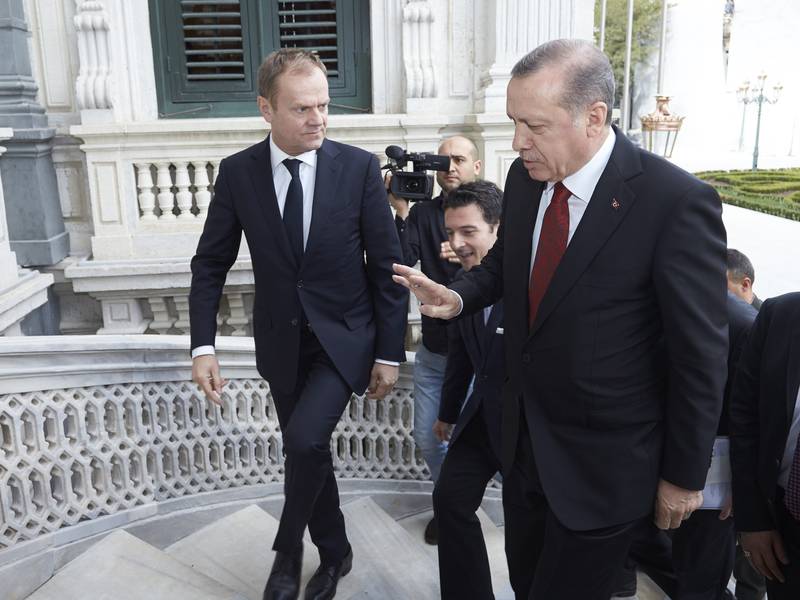
In Ljubljana, the former Polish PM outlined three elements for dealing with the problem – better coordination and avoiding unilateral actions; giving mass support to Greece; and finally having the EU-Turkey plan start working. In Athens, he showed the migrants the other face of the EU (not the Angela Merkel one). “I want to appeal to all potential illegal economic migrants wherever you are from: Do not come to Europe. Do not believe the smugglers. Do not risk your lives and your money. It is all for nothing.” Also in the Greek capital he announced the end of the transit state: “Greece or any other European country will no longer be a transit country. The Schengen rules will enter into force again”, he said, never explaining how this will happen with the states that are not Schengen, or even EU members.
In Ankara, the President of the European Council said that it was up to Turkey how to ensure the reduction of refugee flows towards Europe. Making the situation even more Faustian, right around Tusk’s visit in Turkey the headquarters of one of the most read Turkish daily newspapers Today’s Zaman was stormed in. This got dismissed with a classic distanced declaration of the spokesperson for the European External Action Service. “Any country, and in particular those negotiating EU accession, needs to guarantee fundamental rights, including freedom of expression, and due judicial process, in line with the European Convention on Human Rights (ECHR)”, says the short statement. On the eve of the summit the leader of the liberals group in the EP, Guy Verhofstadt (Belgium), urged the EU not to sell its soul to Turkey because of not being able to deal with its problems.
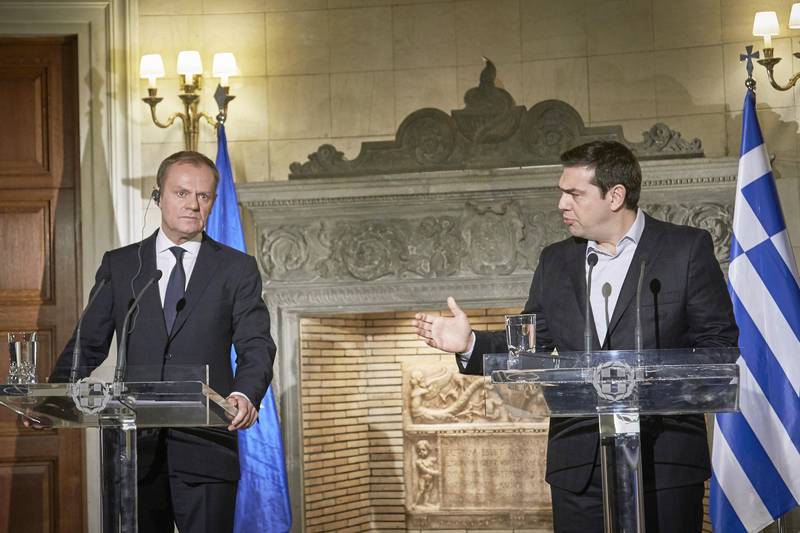
On Monday, Turkish PM Ahmet Davutoğlu will be in Brussels for a meeting with European leaders, when the next attempt is to be made for the joint Turkish-European plan to work out. Turkey is expected to take in all migrants, apprehended in Turkish seas. Meanwhile, the situation at the Greek-Macedonian border has started to slip out of control. To appease the growing wrath in Athens, the EC approved on Wednesday an urgent humanitarian package at the amount of 700 million euro. Greece this week once again found itself pinched between the two parallel universes, which intersect in it – on the one hand the Greek government is attempting to comply with the institutions’ requests, so that the first review of the bailout programme could end in success and Greece can receive the next life-saving financial injection, and on the other hand it is being squeezed by Schengen, the obligations to which are bleeding dry the already empty Greek treasury.
After the humanitarian package, the EU came up with a plan for saving Schengen, which envisages normalcy restored by the end of the year, despite the many what-ifs. Neither Tusk, nor the Commission, however, have a plan B – what will happen if the Western Balkans route gets closed? What will happen to the refugees, who are already in Greece and what will happen to all those, who continue to strife for Europe? Neither the Commission, nor Tusk are answering the question what will happen if the refugee flow bursts out somewhere else and opens a new route. It is not clear how, after tolerating it for so long, transit states will stop being transit.
Croatia with a government of the “Dr Jekyll and Mr Hyde variety”
The situation in Croatia last week was not less schizophrenic. The model of failing to function of the EU has infected little Croatia, which last week found itself with a fully blocked government. The image Prime Minister Tihomir Orešković has been building abroad is of a cosmopolitan, reformist-oriented expert, while within the country his two deputies, Tomislav Karamarko and Bozo Petrov, are building for Croatia the outlook of a provincial little Balkan state, which cannot dislodge from its past and it is its only source of a future. While the PM was on an official visit to Germany, his two deputies held separate meetings with ambassadors and gave separate press-conferences.
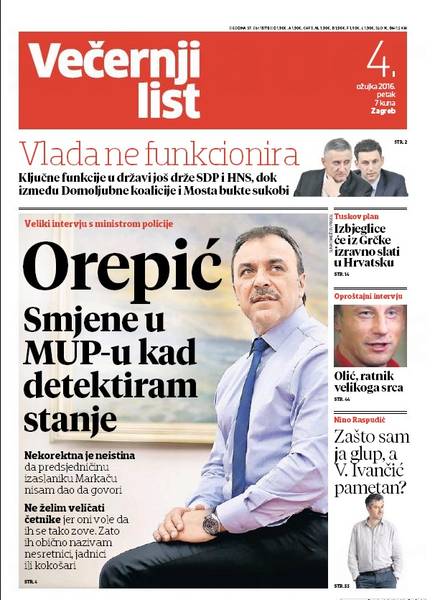
The conflict between the two coalition partners – the Croatian Democratic Union (HDZ) of Tomislav Karamarko (member of EPP) and the made up of independent lists party MOST of Bozo Petrov – has deepened further last week. The next head rolled – the director general of the Croatian national radio and television (HRT), Goran Radman, was dismissed after a full-blown saga of actions. His dismissal was supposed to be reviewed at by the parliamentary media committee, but minutes before its meeting the MPs were informed via text messages that the meeting was not going to be held. Several hours later it finally was held and Mr Radman was dismissed without being allowed to appear and present his position. He did that at a separate press conference, at which he announced that his dismissal was politically motivated and would have consequences. The union of journalists in Croatia also criticised the dismissal and voiced concerns about the freedom of speech in Croatia and the deployment of a Polish-Hungarian scenario.
At another front where the HDZ demands a purge – Ministry of Internal Affairs – MOST managed to withstand the pressure. Their Interior Minister Vlaho Orepić refused to change the heads of police, the police unit of the special prosecution for fight against corruption (USKOK) and all other directorates under the under the umbrella of the interior ministry. Prime Minister Orešković, in turn, has yet to sign the request for the change of the boss of counterintelligence.
Journalists have commented over the past week the next in a series of scandal weeks in Croatia in favour of PM Tihomir Orešković. In the highly circulated daily Vecernji list, Sandra Veljković writes [in Croatian] that the Berlin visit of the political novice Orešković had made a big impression. His meeting with German Chancellor Angela Merkel and then with the visiting Zagreb European Council President Donald Tusk showed that the member of the Croatian Diaspora in Canada had emancipated himself from national political intrigues and is taking matters into his own hands. Helena Puljiz is taking an even braver step in her commentary [in Croatian] for tportal by saying directly that the PM is taking a step forward and his deputies two steps back.
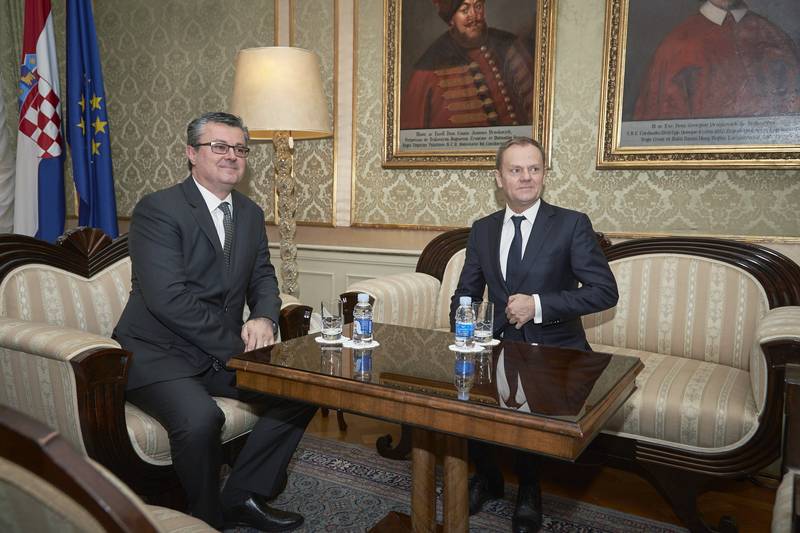
She notes that Tihomir Orešković was convincing in his conversations with Angela Merkel, sent clear messages and noticeably improved his command of the Croatian language. It looked as if nothing could besmirch the good impression that he left in Berlin, only if his power did not rest on the relations of his two “disproportionately vain and sneaky aides Tomislav Karamarko and Bozo Petrov”, writes the columnist.
Serbia is in election mode
Serbian President Tomislav Nikolić signed last week a date for the snap parliamentary elections – April 24. This will turn out to be a tough campaign, which, it seems, is going to be joined by Russia as well. The news from Serbia last week were that PM Aleksandar Vučić would not sign the agreement with Russia, which would grant the workers in the Russian-Serbian humanitarian centre in Niš the same privileges that NATO received, reported [in Serbian] the newspaper Danas, quoting sources. Earlier, PM Vučić announced that he would not have a referendum over NATO membership. This sparked a sharp reaction by “our good friend and brother” Russia. Despite being against the West’s intervention in Serbia’s domestic affairs, Moscow has no scruples about giving Belgrade advice.
Serbian state television announced [in Serbian] that the website of the ruling party in Russia – “United Russia” – had published the reaction of Sergey Zheleznyak, a high-ranking official in the party. “Responsible politicians are just the ones, to whom the interests of citizens are a priority and who realise their will”, says in Zheleznyak’s statement. This is exactly why the request for a plebiscite together with the preliminary parliamentary elections fully corresponds to the people’s will, he thinks.
Meanwhile, it was announced that Russia was starting a mass purchase of media in Serbia. Blic reported [in Serbian] last week that Russia is planning to purchase a Serbian TV station with national coverage, a daily, and a marketing agency. This is supposed to happen through the close to Russia Serbian oligarch Bogoljub Karić. “Karić is the main contact and intermediary. Until the deal with the purchase of the TV station goes through, Russia is not staying idle. A large investment is planned in the internet website Sputnik Srbija. A cable TV channel follows, as well as a re-transmission of the Russian TV channel Russia today”, claims a source of Blic. The newspaper says that, at the moment, pro-Russian parties in Serbia have the best positions in 15 years.
Both Sputnik and Russia Today are among the most disproved media by the European myth-busters, created by the European External Action Service to fight Russian propaganda. Main buyer on the Russian side will be the Russian oligarch Konstantin Malofeev, who is in the ban list of the EU. He is tightly linked to the Ukrainian separatists in Eastern Ukraine and the Crimea, former employer of the “Prime Minister” of the so called “Donetsk People's Republic”, are the EU’s motives for including him in the list.
Another important event in Serbia was the message, again from Blic, that the handing in of Vojislav Šešelj to the Hague tribunal is being delayed until the elections go through, so he can be kept quiet.
Bulgaria celebrates its independence
Russia was actively present at the celebrations for March 3rd – Bulgaria’s Independence Day, traditionally commemorated by four non-working days. A little before the short workweek ended, the government approved the revised anti-corruption bill, which provides for the formation of a unified agency for fighting corruption. The new body will have enhanced powers. Parliamentary groups have yet to discuss the draft. If it becomes law, an important test will be to see in practise how will it work and how independent will the new body be. The Best case scenario will be a small step towards catching up with Romania.
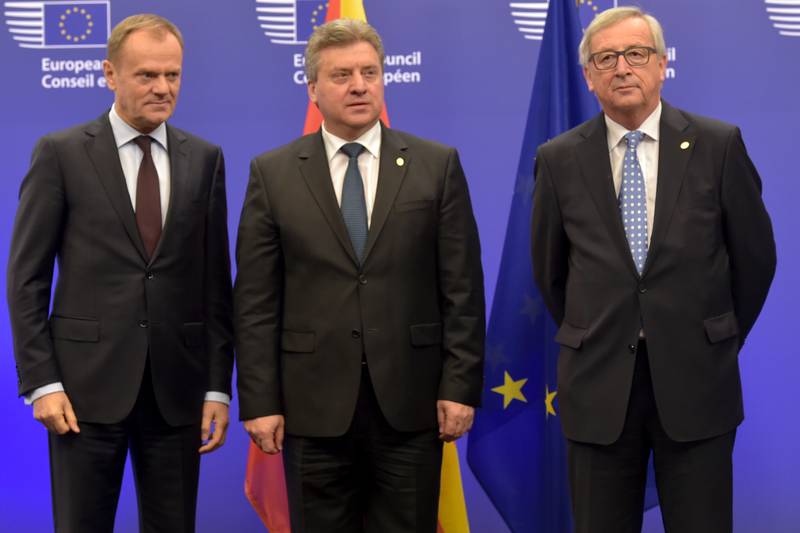
And while Bulgaria was celebrating profusely its independence, Macedonia had its moment of glory. Utrinski vesnik happily noted that EC President Jean-Claude Juncker had mentioned the country by its constitutional name (Macedonia) during a press-conference with Norwegian PM in the beginning of last week. To the newspaper this obviously meant official recognition in a very delicate situation to the European Union, who is trying to keep Greece in Schengen, while at the same time giving it the role of a refugee buffer, and with the other hand giving aid to Macedonia, so that it keeps its border with Greece airtight.
Translated by Stanimir Stoev
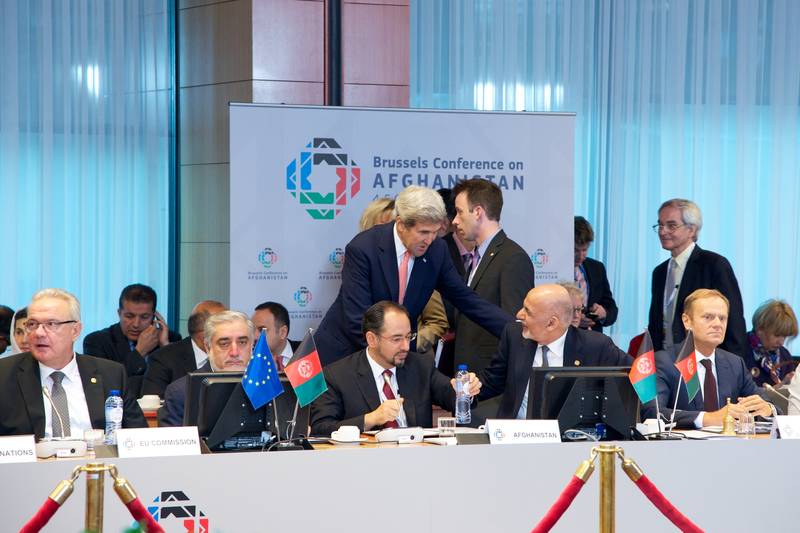 | © Council of the EU
| © Council of the EU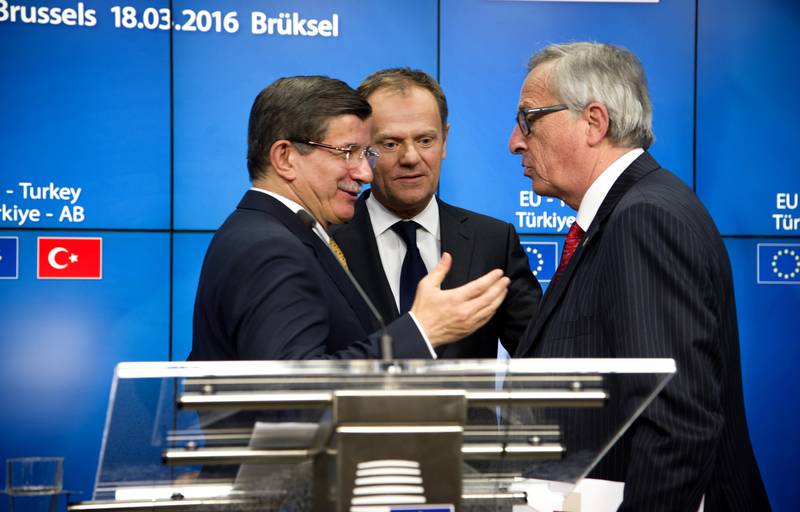 Davutoglu, Tusk, Juncker | © Council of the EU
Davutoglu, Tusk, Juncker | © Council of the EU Bakir Izetbegovic, Andrej Plenkovic | © Council of the EU
Bakir Izetbegovic, Andrej Plenkovic | © Council of the EU Aleksandar Vucic, Recep Tayyip Erdogan | © Serbian Presidency
Aleksandar Vucic, Recep Tayyip Erdogan | © Serbian Presidency Jean-Claude Juncker, Zoran Zaev | © European Commission
Jean-Claude Juncker, Zoran Zaev | © European Commission Kolinda Grabar-Kitarovic | © KGK
Kolinda Grabar-Kitarovic | © KGK Jozo Rados | © European Parliament
Jozo Rados | © European Parliament Aleksandar Vucic, Andrej Plenkovic | © Vlada RH
Aleksandar Vucic, Andrej Plenkovic | © Vlada RH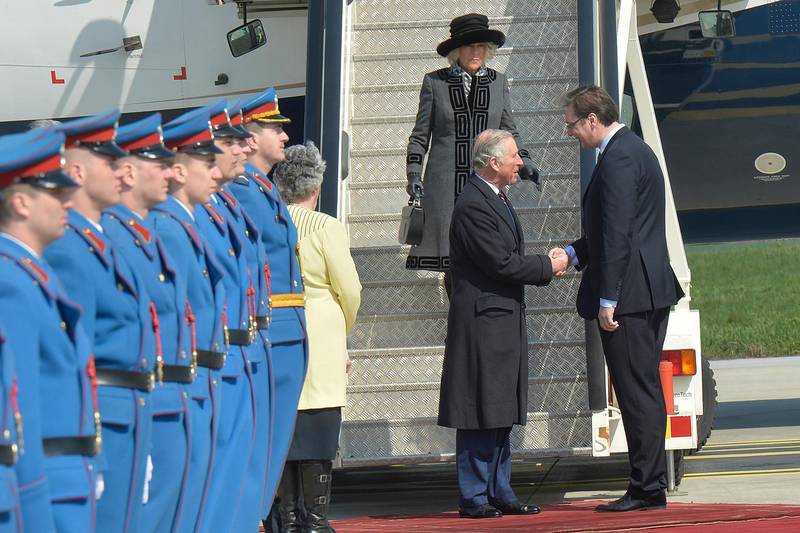 | © Vlada RS
| © Vlada RS